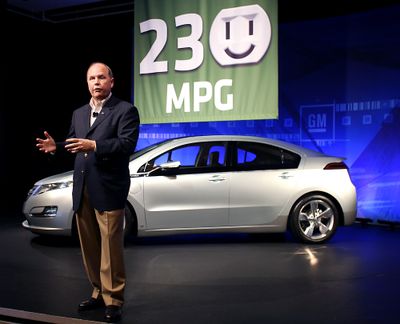Volt will get 230 mpg, GM says
Triple-digit fuel economy estimates based on city driving

General Motors Co. said Tuesday that its long-awaited Chevrolet Volt plug-in hybrid is expected to achieve fuel economy of 230 miles per gallon in city driving.
That would give the Volt, which is expected to arrive in showrooms late next year, by far the highest fuel efficiency rating of any car rated by the Environmental Protection Agency. The current EPA mileage leader is the Toyota Prius hybrid, which is rated at 50 mpg in combined city-highway driving.
The Volt is designed to run on electric power only for about 40 miles, after which a small gasoline engine kicks in to recharge the battery, giving it a range of more than 300 miles. The battery can be recharged by plugging in to a home outlet.
GM’s estimated mileage rating for the Volt is based on city driving. Highway mileage probably would be lower because it would require more work from the gasoline engine.
“From the data we’ve seen, many Chevy Volt drivers may be able to be in pure electric mode on a daily basis without having to use any gas,” GM Chief Executive Fritz Henderson said. “EPA labels are a yardstick for customers to compare the fuel efficiency of vehicles. So, a vehicle like the Volt that achieves a composite triple-digit fuel economy is a game-changer.”
The automaker’s fuel economy estimates still have to be confirmed by the EPA, which is developing a new methodology for calculating fuel economy ratings for cars that can travel significant distances powered only by electricity. GM said it used the EPA’s preliminary guidelines in developing its mileage estimates for the Volt.
The Volt’s best fuel economy will be achieved in city driving, where it can take full advantage of its all-electric capability. GM said it has calculated a highway mileage estimate for the Volt but didn’t release the figure. The automaker said it was confident the car’s combined city-highway fuel economy “will be in the triple digits.”
Electric-vehicle proponents, although encouraged by the Volt’s preliminary numbers, cautioned GM not to overstate the car’s capabilities.
“The phrase ‘Your mileage may vary’ is particularly true with plug-in hybrids because how you drive will have a significant impact on how much gasoline the vehicle consumes,” said Jim Kliesch, a senior engineer with the Union of Concerned Scientists. “It would be a real shame if such a promising technology got a bad rap because they raised expectations too high.”
The company said it had produced about 30 Volts and was making 10 a week at its pre-production facility in Warren, Mich. GM is expected to announce later this week that the Volt’s nearly 400-pound lithium-ion battery will be assembled at a plant in the Detroit area. The production version car will be built at GM’s Detroit-Hamtramck assembly plant.
As the pre-production vehicles are road-tested, estimates of the cars’ all-electric range and their eventual fuel economy rating could change. Volts are being road-tested in Yuma, Ariz., to gauge their performance in hot weather.
GM has staked much of its technological reputation on the Volt and has touted the vehicle for more than two years. Some critics have called the vehicle an expensive piece of “vaporware” that would never achieve significant sales, but the automaker has maintained that it is committed to the Volt.
“Right now, there are no foreseeable roadblocks to the program and the program’s timing,” GM spokesman Rob Peterson said.
Although GM has not released pricing information, industry analysts estimate the Volt will list for about $40,000. Peterson said Volt owners would be eligible for the $7,500 federal tax credit provided on electric vehicles.
Several other automakers, including Chrysler, Nissan, Ford and Toyota, are working on plug-in hybrids or all-electric vehicles that are expected to reach the market over the next few years.